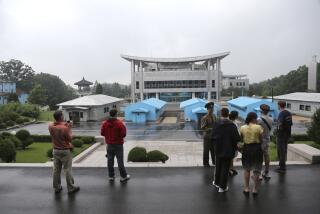Asians See Bush Cancellation as Sign of U.S. Problems : Diplomacy: Japan’s new leaders had hoped to make the visit a ‘starting point.’ Seoul wanted to discuss nuclear issues.
- Share via
TOKYO — In Seoul, the South Korean Foreign Ministry had just finished announcing the planned visit of President Bush when word arrived that he wasn’t coming. Korean diplomats hastily retracted the announcement.
In Tokyo, on his first full day in office, Prime Minister Kiichi Miyazawa had to confess to reporters that he didn’t know the details of why Bush had suddenly decided to cancel a four-nation Asian tour, with an emphasis on Japan.
Such was the surprise at the announcement that Bush was postponing his trip, which was to begin in Japan and end with a visit to Pearl Harbor on Dec. 7, the 50th anniversary of the surprise Japanese attack that propelled the United States into World War II. Visits to South Korea, Singapore and Australia were also planned.
But the longer-range meaning of Bush’s postponement went beyond regret and disappointment--words that emanated from the countries that the President had planned to visit. Throughout Asia, his trip’s delay served to underscore not only Bush’s personal political problems at home but also the relative weakening of the American economy that has become so evident in recent years in the Asia-Pacific region, where growth rates top the world.
The late President Dwight D. Eisenhower was forced to cancel a Japan trip in 1960 because of a political uproar in Tokyo over revision of the U.S.-Japan Security Treaty and the high-handed tactics of the government of the late Prime Minister Nobusuke Kishi in ramming the new treaty through Parliament.
But Bush’s decision marks the first time that an American leader has been forced to drop an overseas trip to Asia because of troubles in the United States.
“The timing could hardly be worse. The new (Miyazawa) administration just takes office and is welcomed by this--giving the impression that this is all that Japan-U.S. relations amount to,” Japanese newspapers quoted one high Foreign Ministry official as complaining.
The Yomiuri newspaper said in an editorial: “We are concerned that (the postponement) may prove to be a turning point toward the United States looking inward.”
With the 1992 presidential election campaign considered likely to demand even more of Bush’s time next year, Japanese diplomats immediately pondered the possibility that the postponement would, in effect, become a cancellation.
Foreign Minister Michio Watanabe told reporters that he would recommend that Miyazawa make an early trip to the United States, if it becomes clear that a long time would pass before Bush could make it to Tokyo. If Miyazawa makes such a trip, early January would be the most likely time.
Both Miyazawa and Watanabe tried to put the best face possible on the trip delay.
The prime minister said he understood the importance of Bush staying home to oversee passage of economic legislation in Congress. And the foreign minister, noting that four American Cabinet secretaries had scheduled trips to Tokyo this month, commented that “so many U.S. officials are coming that it’s as if the White House is moving to Tokyo.”
Secretary of State James A. Baker III, Trade Representative Carla Anderson Hills, Defense Secretary Dick Cheney and Energy Secretary James D. Watkins all are to visit here within the next two weeks. Gen. Colin L. Powell, chairman of the Joint Chiefs of Staff, will accompany Cheney.
“It’s a pity that the President can’t come, especially because . . . we had hoped to discuss global leadership as partners,” Watanabe said. “Nothing in particular is likely to happen to Japan-U.S. ties (because of the trip delay), although it would have been better if he could have come.”
In South Korea, official reaction was sparse. But Korean officials had been looking forward to the visit to discuss with Bush his recent decision to withdraw ground-based nuclear weapons from South Korea. Before Bush made the decision, President Roh Tae Woo had publicly declared that stripping nuclear weapons from South Korea would be “meaningless,” as long as neighboring China and the Soviet Union still had them. Communist North Korea is suspected of working to develop nuclear weapons.
Singapore, which has agreed to allow U.S. naval ships to use its repair facilities, will lose a “thank you” for its help in plugging part of the gap that will be created by an eventual U.S. military withdrawal from the Philippines. And Australia, which has been waiting for a presidential trip since 1989, will have to wait a little longer.
Timed specifically to add a positive, “future-oriented look” to U.S.-Japan relations on the eve of the 50th anniversary of Pearl Harbor, Bush’s visit here was to offer him and Miyazawa, elected prime minister Tuesday, a chance to issue an “America-Japan charter.”
Miyazawa, who said he wanted the document to “set a course for the next 50 years of Japan-U.S. relations,” spent three hours Monday working on the declaration. Foreign Ministry officials said privately they had hoped to make the Bush trip the “starting point” for the Miyazawa administration.
They also expressed fears that the delay would remove a moderating influence on war memories that the Pearl Harbor commemoration ceremony is certain to stir. But one official, who asked not to be named, took heart from Bush’s cancellation at Pearl Harbor. “If he didn’t come to Japan and did go to Pearl Harbor, the reaction here would have been severe,” he said.
More to Read
Sign up for Essential California
The most important California stories and recommendations in your inbox every morning.
You may occasionally receive promotional content from the Los Angeles Times.









